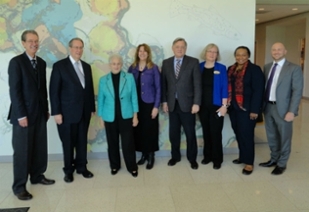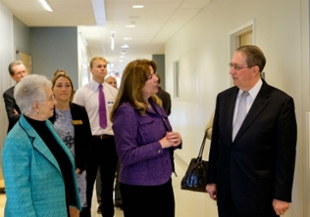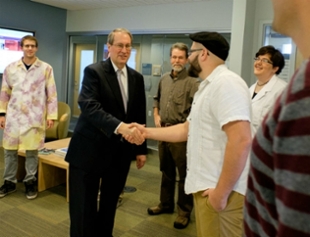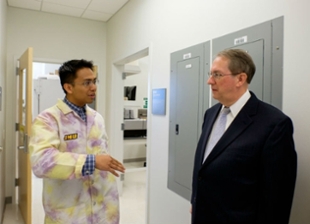Federal Lawmakers Tour JMU's Bioscience Building
NewsOn Tuesday, October 6, U.S. Representatives Bob Goodlatte (VA-6) and Virginia Foxx (NC-5) visited James Madison University’s Bioscience Building as a part of the 7th Annual Biological Sciences Congressional District Visits Initiative. Founded by the American Institute of Biological Sciences, this national movement encourages federal and state lawmakers to connect with local research facilities in order to better understand the scientific projects being conducted there.

Congressman Goodlatte and Congresswoman Foxx were greeted by several university leaders, including Provost and Senior Vice President for Academic Affairs A. Jerry Benson, Vice Provost for Research and Scholarship Yvonne Harris, Dean David Brakke of the College of Science and Mathematics, Biology Department Head Joanna Mott, Director of JMU’s Biotechnology Program Marta Bechtel, and Director of Research Development and Promotion Ben Delp.
The building tour began with a presentation from Dr. Mike Renfroe on JMU’s current research effort to test whether industrial hemp seed can be planted in Virginia agricultural fields with conventional agricultural equipment, harvested by conventional agricultural equipment, and processed into biodiesel. Next, Dr. Marta Bechtel led the Representatives on a tour of the biotechnology lab space. JMU offers the only undergraduate biotechnology program in the Commonwealth, and Dr. Bechtel showcased the unique opportunities the program creates through hands-on research and faculty-student mentoring.

Biology Professor Dr. Reid Harris shared his recent success in patenting a potential cure to athlete’s foot through the use of skin probiotics, adding that he hopes to have a Virginia start-up company bring the innovation to market. Instructor John Marafino and graduate student Elizabeth Rogers also spoke with the Representatives, discussing a current chemistry-biology interdisciplinary research initiative on amphiphile compounds. The compounds are being studied in the hopes of developing a new and improved way to sanitize hospital equipment. Representative Foxx was especially impressed with the idea, recognizing the need for a solution to the problem of hospital-acquired infections—infections which cause tens of thousands of deaths each year. The goal of the amphiphile project is to develop compounds that could be used not only to destroy bacteria on a surface, but to make the surface actively resistant to further contamination.

“The research being done at universities such as JMU is largely student-driven, and these students are preparing to become the next generation of scientists working on new global health issues,” said Rogers. “It is important for those in Congress to be familiar with what is being done by these students so that they can better provide the opportunities and tools needed to help solve problems.”
Before the tour came to an end, Microbiology Professor Dr. James Herrick and graduate students Kevin Libuit and Curtis Kapsak showcased a lab devoted to genome and metagenome studies. This is a JMU interdisciplinary initiative that gives students the opportunity to conduct lab tests relating to DNA sequencing. Dr. Herrick’s lab, for example, is studying local stream water for bacteria containing antibiotic-resistant genes. Kapsack showed Representative Goodlatte the device he uses to analyze bacterial DNA, a portable gene sequencer called a MinION. Goodlatte was surprised to see how small it was, joking that it looked like a harmonica. Kapsack agreed, explaining how amazing it was to have access to technology that could be used to accurately read genetic code, but was also small enough to carry in your back pocket.

“I think it’s important for Congressmen and women to know about our projects to understand the overarching goals for why each lab carries out research and how [that research applies] to our lives,” said Kapsack. “Many of our different projects involve studying antibiotic resistance in microorganisms. This is an important issue that can help [our leaders] make informed decisions on legislation involving the use of antibiotics.”

